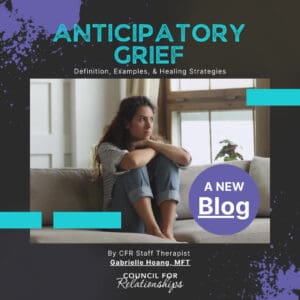Anticipatory Grief: Definition, Examples, & Healing Strategies
Grief can appear in many unexpected ways, even before a loss occurs. In this blog, Council for Relationships therapist Gabrielle Hoang, MFT, explores the concept of anticipatory grief. She explains the anticipatory grief definition and why some people refer to it as preemptive grief. Gabrielle also addresses the common question, “What is anticipatory grief?” and offers guidance on how to cope with anticipatory grief when it begins to shape daily life.
Drawing on her clinical experience, Gabrielle provides insight and compassion for anyone navigating this unique form of grief.
Anticipatory Grief Definition: What It Means and Why It Matters
Summer is an odd time to grieve. The season feels antithetical, almost like you’re throwing a pity party amid all the life bursting around you. Life shows up in the cracks of the pavement, where budding plants emerge. You can see it in the abundant pyramids of fruit stacked at farmer’s markets. You can also feel it in the vibrant colors of dresses worn by bodies laughing in parks.
As a therapist who does like working with grief, I think back to a graduate professor whose profound words still carry weight: “Most therapy work is grief work.”
Grief is a universal response that escapes none. We grieve in all the ways we classically think about loss, usually the deaths of our loved ones. But we also grieve in ways that go unnamed. When I look at my personal life, I notice grief showing up in unexpected places. It can be felt alongside so many changes. My parents growing older, my childhood home being sold, my relationship with myself as time passes.
These changes in my life may feel like what you experience. It feels weird to feel so many feelings, especially when nothing has happened, right? It could even feel like you’re experiencing some level of preemptive grief. You might be. In fact, there’s something called “anticipatory grief,” or the feeling of all the emotions associated with grief before the actual loss occurs.
Some may ask, “What is the the anticipatory grief definition?” To me, it means naming the complicated emotions that appear when we fear what’s ahead. For me, this means thinking about my parents, callouses in their hands and streaks of silver in their hair. I think about my childhood home, the laughter the rooms welcomed and the sadness that it has held for my family. I think about the younger version of me, appreciating parts of her that I didn’t before.
What is Anticipatory Grief
Grief itself is an interesting emotion because it’s a bucket that catches all the fragment emotions that can be felt during a loss. There is anger, resentment, happiness, nostalgia, and bitterness. At times there may even be sweetness. The list could take up this entire blog.
The simplest anticipatory grief definition is the experience of grief before an actual loss occurs. It is the storm before the storm, when emotions rush in even though nothing final has happened yet. Some people use the phrase “preemptive grief” when searching for an explanation, but both terms describe the same emotional reality: grieving before loss.
Examples of Grief
As mentioned, grief has many causes, but I wanted to highlight some that may go unidentified.
Break-ups: Whether it be divorce, separations, or break-ups, the parting of ways between people can be extremely devastating. You may find yourself grieving a person who is still alive. You may also grieve the future that once felt so real.
- Growing Older: It can be seeing loved ones grow older and associating these changes with time running out, but it can also be seeing yourself age and how much things are different now.
- Loss of a Job: It can be voluntary (retirement or moving to a different job) or involuntary (layoff or being fired), and these feelings can trigger feelings of loss.
- Moving: It could be you moving, or it could be a loved one moving, but saying goodbye to a familiar place may also bring up a sense of loss and nostalgia for what once was.
What are Symptoms of Anticipatory Grief?
A natural question when thinking about anticipatory grief—or preemptive grief—is how it may affect us. The experience can show up in the body, in emotions, and in the way we think. These symptoms are not always obvious but recognizing them is an important step toward care and healing.
Physical symptoms of anticipatory grief may include fatigue, muscle weakness, or changes in appetite. Some people notice difficulty sleeping, trouble concentrating, or even skin breakouts. For people who menstruate, changes in the menstrual cycles can emerge as a stress response. The body often carries grief long before words can.
Emotional symptoms are often more recognizable. Anticipatory grief can bring deep sadness, anxiety, or anger. Feelings of loneliness and isolation may appear even when surrounded by others. At times, emotions can shift quickly. You may move from resentment to nostalgia, or from bitterness to gratitude. These shifts can leave you feeling unsettled.
Cognitive symptoms involve the way the mind responds to the possibility of loss. Many people find themselves preoccupied with thoughts about the future. Some spend hours replaying imagined scenarios in their heads. Others may withdraw from loved ones, feeling consumed by what is to come. These patterns can make daily life feel heavy, even when nothing has happened yet.
While symptoms vary from person to person, knowing how anticipatory grief shows up—physically, emotionally, and cognitively—can help you understand what you are experiencing and give it a name.
How to Cope with Anticipatory Grief
When grief feels overwhelming, the first step is often to acknowledge and validate what you are experiencing. Naming your emotions as anticipatory grief allows you to understand them for what they are, rather than dismissing them as confusion or weakness. Simply saying to yourself, “I am grieving,” can create space to begin healing.
Self-care also plays a vital role in coping. For many, learning how to cope with anticipatory grief—or preemptive grief specifically—means creating daily practices of support and grounding. Connecting with supportive friends, family members, or a therapist can lessen the weight of carrying your feelings alone. Writing in a journal, moving your body, or practicing mindfulness can give grief an outlet. These practices prevent emotions from remaining bottled up. These practices are not a cure, but they can make the experience more manageable.
Another way to address anticipatory grief is to prepare for the changes ahead. Thinking through how a loss may impact your daily life, relationships, or sense of identity can be helpful. This reflection can soften the shock when it finally happens. This kind of preparation is not about erasing pain but about building resilience and a sense of readiness.
Rituals can also be grounding. Creating space to honor your loss can bring comfort. This might mean visiting a meaningful place, sharing stories with others, or writing letters you may never send. These small acts remind us that our connections endure, even when circumstances change.
Time & Healing from Anticipatory Grieving
Finally, time remains the most powerful companion in grief. It cannot be rushed, and it does not always move in a straight line, but it allows for feelings to rise, fade, and return in new forms. Understanding that both change and grief are constants can remind you that while the pain of loss is real, so too is your capacity for healing and love.
If you’ve been wondering how to cope with anticipatory grief in your own life, remember that support, self-care, and time are essential companions in that process.
Living with Anticipatory Grief & Preemptive Grief
Grief and loss are inevitable characters in life that will continue to greet you like old friends, whether invited or not. Anticipatory grief has taught me that while these losses can be extremely painful, they serve as a reminder I am capable of caring and loving something so acutely.
And while these reflections are coming about in summertime, fall will creep in, bringing with it a change in season, with its own beauty and shortcomings. If your grief feels ceaseless, I encourage you to remember that change is certain. Feelings will pass, they will fade, and they will come again, each time serving as a reminder for your capacity for caring so deeply.
Editor’s Note: The views expressed in this blog are those of the author and do not necessarily reflect the official policy or position of Council for Relationships.
Continue Your Journey Through Grief & Healing
No matter where you are in your process—whether you’re just beginning to wonder what anticipatory grief is or if you’ve been navigating its weight for some time—therapy can help you move forward. At Council for Relationships, we know grief is not only about endings but also about connection, meaning, and resilience. The journey of healing does not have to be faced alone. With support, it becomes a process of growth and deeper care.
Take the next step and schedule a free 15-minute consultation with CFR Staff Therapist Gabrielle Hoang, MFT to explore whether therapy might be right for you.

Contact Gabrielle for a free, 15-minute consultation.
About Philadelphia & Wynnewood Therapist Gabrielle Hoang, MFT
Gabrielle Hoang, MFT, is a marriage and family therapist who supports individuals, couples, and families in navigating emotions, relationships, and life transitions. She works with clients experiencing grief, including anticipatory grief—sometimes called preemptive grief—helping them understand the emotions that arise before a loss. She also provides therapy for young adults and children of immigrant parents, addressing the unique challenges of identity, mental health stigma, and cross-cultural family dynamics.
As a child of immigrants herself, Gabrielle deeply understands the complexity of holding multiple values and identities. She is committed to empowering Asian American clients and children of immigrant families to embrace their voice and their story. Gabrielle also specializes in helping couples break cycles of conflict and develop healthier ways of communicating and connecting.
Gabrielle sees clients in Philadelphia, Wynnewood, PA, and online. She offers a compassionate, collaborative approach grounded in respect for each person’s lived experience.
Anticipatory Grief, Coping, & More from CFR
Here’s how Council for Relationships can support your next step. With over 70 expert therapists and psychiatrists, CFR offers integrated care that combines compassion with clinical expertise.
- Get matched with a CFR therapist who’s right for you
- Explore more blogs on grief, relationships, identity, and mental health
- Sign up for our email list to receive resources, event updates, and therapist insights
Grief is not a journey you need to face on your own. Whether you’re learning the anticipatory grief definition, exploring how to cope with anticipatory grief, or seeking support for another life challenge, CFR is here to walk with you.
Marriage and Family Therapist in Philadelphia Aspires to Empower

